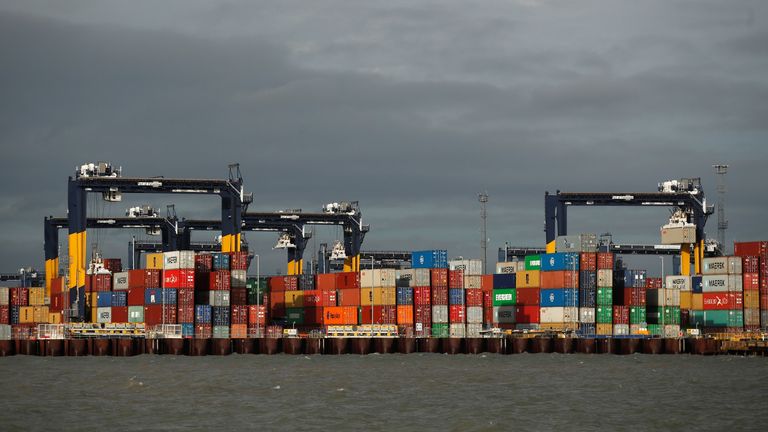A major global shipping company has blamed a backlog of containers at UK ports for a decision to divert vessels elsewhere, threatening delays to deliveries as the pre-Christmas trade rush gets underway.
Maersk said it was re-routing one 80,000-tonne container ship per week from Felixstowe, the UK’s largest commercial port, to unload elsewhere in Europe.
Smaller vessels were then to be used to get deliveries bound for the UK to Felixstowe or another port, a company spokesperson explained, because smaller berths currently had greater spare capacity for incoming goods.
She said that high demand for shipping space globally, coupled with the HGV driver shortage, had backed-up containers at the largest berths at Felixstowe but added that the UK port was not alone in experiencing bottlenecks from time to time.
Image: Containers at the Port of Felixstowe. File picMaersk’s global ocean network chief Lars Mikael Jensen earlier told the Financial Times: “We had to stop operations on a ship because there was nowhere to discharge the containers.
Advertisement“Felixstowe is among the top two or three worst-hit terminals.
“We are having to deviate some of the bigger ships away from Felixstowe and relay some of the smaller ships for the cargo.
More from Business“We did it for a little while over the summer and now we’re starting to do it again.”
The British International Freight Association told Sky News that dwell times – the amount of time a container was waiting to be picked up at Felixstowe – had almost doubled to just shy of 10 days over the past fortnight.
A spokesperson for the port, which handles more than a third of UK ship-based cargo, said: “The pre-Christmas peak, combined with haulage shortages, congested inland terminals, poor vessel schedule reliability and the pandemic, has resulted in a build-up of containers at the port.
“The vast majority of import containers are cleared for collection within minutes of arriving and there are over 1,000 unused haulier bookings most days.
“However, the situation is improving and there is more spare space for import containers this week than at any time since the beginning of July when supply chain impacts first started to bite.”
The added: “We are working closely with all our shipping lines customers to accommodate their vessels. This can be challenging as a high proportion of ships are off schedule due to the well-publicised global supply chain issues and imports continue to arrive faster than the UK supply chain can handle them due to the well documented haulier shortage.
“As a result, and on occasions, we understand and regret lines have to prioritise the services they have.”
Image: Maersk had more than a fifth of the global shipping market in the pre-pandemic year of 2019Maersk also warned that growing delays could mean retailers would be forced to prioritise what they ship to deal with the congestion.
Tim Morris, chief executive of the UK Major Ports Group, said action had been taken to address the well-documented problems this year to limit the damage and ports were “managing access to storage space” in extreme circumstances.
“They have extended gate opening to 24/7, increased capacity for trucks at peak hours, sought to maximise rail freight usage within the significant constraints of the network, created additional storage space and recruited more people.
“But the pressures are being exacerbated by well-publicised issues impacting all UK supply chains, notably shortages of HGV drivers.”
While the UK is not alone in facing supply chain disruption arising from economies getting back in gear following the COVID-19 shock, it is short of around 100,000 HGV drivers to ensure deliveries are made across the economy.
PM not ruling out more temporary visasThere is a Brexit link too, as many drivers returned home after 1 January, and a temporary visa scheme – announced by the government to appease angry business leaders – seems to have failed to lure many back.
Competition for shipping contracts has forced up costs dramatically and contributed to the surge in inflation globally.
Retailers have also highlighted order problems in China and east Asia, where pandemic restrictions and poor weather conditions have affected shipping.
